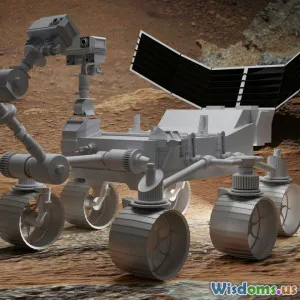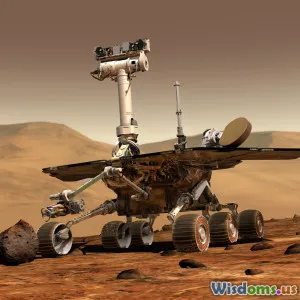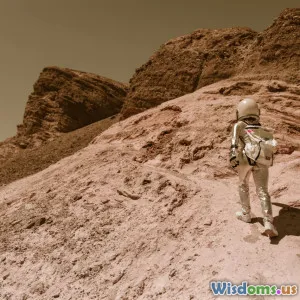
Science Fiction's Vision of Space Colonization
6 min read Explore how science fiction envisions humanity's future in space colonization, from Mars habitats to interstellar travel. (0 Reviews)
Science Fiction's Vision of Space Colonization
Science fiction has always served as a canvas for our dreams, fears, and aspirations. One of the most captivating themes in this genre is the colonization of space. From the early tales of space travel to contemporary narratives, authors have explored the possibilities and implications of humanity venturing beyond Earth. This article delves into how science fiction envisions space colonization, its implications for our future, and how it mirrors real-world advancements.
Historical Context of Space Colonization in Sci-Fi
The concept of space colonization is not new. Early 20th-century science fiction works, such as H.G. Wells' "The War of the Worlds" and E.E. 'Doc' Smith's lensman series, hinted at the potential for human expansion beyond Earth. However, it was in the mid-20th century, during the height of the Space Race, that the idea truly gained momentum. Authors like Arthur C. Clarke and Isaac Asimov painted vivid pictures of future societies living on other planets.
Key Works and Their Impact
-
"The Martian" by Andy Weir - This novel provides a realistic portrayal of survival on Mars, emphasizing the scientific and engineering challenges involved in colonization. Weir’s meticulous attention to detail has inspired discussions about the feasibility of human missions to Mars.
-
"Red Mars" Trilogy by Kim Stanley Robinson - This series explores the political, environmental, and ethical dimensions of terraforming Mars. It raises questions about the implications of colonization on alien ecosystems and the responsibilities of humanity as interplanetary citizens.
-
"The Expanse" Series by James S.A. Corey - Combining elements of hard science fiction with political intrigue, this series examines the socio-economic consequences of space colonization, including resource disputes and the emergence of new societal structures.
Themes and Concepts in Space Colonization
Terraforming and Habitability
A recurring theme in science fiction is terraforming—transforming an inhospitable planet into a more Earth-like environment. This idea raises intriguing questions about our understanding of life and the ethical considerations of altering another planet’s ecosystem. Works like Robinson's "Red Mars" illustrate potential methods of terraforming while exploring the philosophical implications of such actions.
Technological Innovations
Science fiction often anticipates technological advancements that could facilitate space colonization. Concepts such as:
- Artificial Intelligence (AI) to manage complex habitats.
- In-Situ Resource Utilization (ISRU) for extracting water and minerals from other celestial bodies.
- Advanced propulsion systems for faster interstellar travel, as seen in the theoretical concepts of warp drives and solar sails.
These innovations, while speculative, inspire real-world scientists and engineers to explore possibilities beyond current limitations.
Societal Implications
The colonization of space also prompts discussions about societal structures. How would governance function on a new planet? Would new political systems emerge? Sci-fi narratives often reflect our current societal challenges, projecting them into future scenarios where humanity must learn from its past mistakes. For instance, the conflicts portrayed in "The Expanse" mirror contemporary geopolitical tensions, suggesting that even in space, humanity may not escape its own history.
Real-World Connections
As we advance in our exploration of space, the visions of science fiction are increasingly becoming intertwined with reality. NASA's Artemis program aims to return humans to the Moon, and private companies like SpaceX are developing technologies for Mars colonization. These initiatives echo the aspirations depicted in literature, demonstrating how fiction can inspire scientific ambition.
Challenges Ahead
Despite the optimistic visions, the challenges of space colonization are immense. Issues such as:
- Radiation exposure in space environments.
- Psychological effects of long-duration space missions.
- Sustainability of life-support systems on other planets.
are all critical factors that need to be addressed to make the dream of space colonization a reality.
Conclusion
Science fiction's vision of space colonization serves as both a source of inspiration and a cautionary tale. As we stand on the brink of significant advancements in space exploration, the narratives crafted by imaginative authors remind us to consider the ethical implications and responsibilities that come with venturing into the cosmos. Ultimately, the fusion of science fiction and real-world exploration may guide humanity toward a future where we can live not only on Earth but among the stars.
Rate the Post
User Reviews
Popular Posts





















